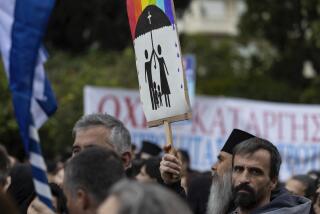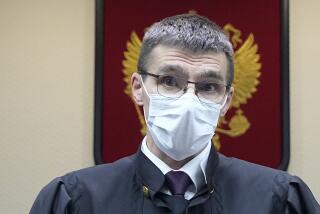Unholy Alliance: Church and Communists
MOSCOW — Superficially, Russia’s recent enactment of a law restoring state control over religious life looks like a victory for the most backward elements in Russian society. The truth is not so simple. This assault on freedom succeeded because key leaders in Russian politics and the Russian Orthodox Church are not traditionalist enough.
The law’s core is not medieval but Soviet. It classifies religious bodies such as church congregations according to the status they had 15 years ago. The more loyal a church was to its faith during the pre-glasnost years--the less willing to make the compromises needed to get official registration from a militantly atheist state--the fewer rights it will have now to engage in basic ministries such as distributing religious literature. Even churches in the most privileged class will have no right to teach religion to anyone but their own “followers.” If consistently enforced--which it won’t be--the law would block even the dominant Orthodox Church from any missionary activities designed to win converts.
The Moscow Patriarchate, the Russian Orthodox Church’s top governing organ, not only accepted but also actively lobbied for such provisions. Working closely with the communist chairman of the parliament’s religion committee, the patriarchate’s representatives retroactively legitimized much of the system that the communists had used to oppress Orthodoxy itself. The powerful Metropolitan Kirill told Catholic and Protestant negotiators that he would fight “to the death” for the sections of the new law that deny basic rights to religious institutions created since the end of the Brezhnev era.
To my Russian friends, the patriarchate’s alliance with the communists is no surprise. They know that at its uppermost level, the patriarchate is Russia’s most Soviet major institution--the only one with the same leaders today as before the demise of the Soviet Union. Most of these bishops rose to the top at a time when one could do so only by winning the approval of the KGB-controlled Council for Religious Affairs, usually by agreeing to serve as a KGB informer. Just as they served as spokesmen for Soviet foreign policy in the 1980s--a role that Kirill still boasts about--they now are aligning themselves with the forces of ultrastatism and ultranationalism.
These forces seem antiquated to most Americans. But from the 2,000-year perspective of Orthodox Christianity, they reflect modern belief systems dating back no more than two or three centuries. The Russian Orthodox Church’s extreme servility to the state is thus a relatively recent aberration, shaped more by imported Western ideas than by the heritage of Orthodoxy.
When the Westernizing Czar Peter I turned the church into a state bureaucracy in the 18th century, his model was not the cradle of Orthodoxy in ancient Byzantium but the latest political fashions from Lutheran Sweden. Russia’s 19th century laws requiring priests to report to the state politically sensitive information from confessions directly violated Orthodoxy’s traditional canons. Then came the ultimate triumph of statism in Russia, from an ideology invented by German atheist Karl Marx. The legacy of that triumph is a peculiarly Sovietized form of Orthodoxy, the central deity of which seems to be not Jesus Christ but the Russian state.
During the vicious war in Chechnya, the patriarchate issued a statement calling on young men to accept military conscription and to obey even orders that they thought unjust. The statement said nothing about the notorious hazing of young recruits that leads annually to hundreds of suicides. It could have been a press release from the Defense Ministry.
Such mutilations of classic Orthodox Christianity are far less influential at the parish level than at the top. But they lend themselves to politicians seeking not ethical guidance but a national identity card, a reservoir of symbols associated with “Russianness.” Since about half of all Russians consider themselves to be Orthodox Christians (though fewer than 5% regularly go to church), this tribal view of Orthodoxy is especially attractive to parties whose own ideologies have lost mass appeal. Communist leader Gennady A. Zyuganov told me in 1994 that one of his top priorities is protecting Russia’s “spiritual heritage.” He seemed oblivious to the irony that his own party had demolished more churches and martyred more believers than any other organization in history.
To cooperate on issues such as the new law on church-state relations, both the communists and the patriarchate have to ignore the core founding principles of their own belief systems. Both seem more than willing.
More to Read
Sign up for Essential California
The most important California stories and recommendations in your inbox every morning.
You may occasionally receive promotional content from the Los Angeles Times.










